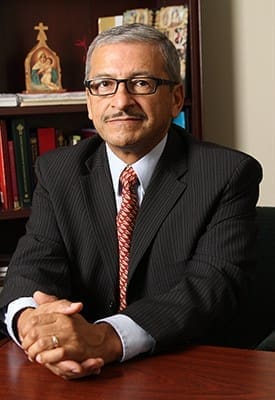Atlanta
From the Pastoral Plan, a new office to build links between Catholics takes shape
By ANDREW NELSON, Staff Writer | Published November 12, 2015
ATLANTA—There are few Catholic churches in metro Atlanta that do not have a multicultural, multilingual congregation. Mass is celebrated in English, Creole, Vietnamese, Igbo, Chinese, Korean, Spanish, Portuguese and more around the 69 counties of the Atlanta Archdiocese.
A new Office of Intercultural and Ethnic Diversity has been organized to serve these many ethnic, language and racial groups in the Atlanta Archdiocese.

Jairo Martinez is the director of the new Office of Intercultural and Ethnic Diversity. Martinez, a parishioner at St. Jude the Apostle Church, Sandy Springs, formerly served as director of the Hispanic Ministry Office. Photo By Michael Alexander
Jairo Martinez, the director of archdiocesan Hispanic Ministries for the last 12 years, has been appointed to lead the new office as the director. Ashley Morris from the Office for Black Catholic Ministry is associate director of the new office and that ministry’s former office manager, Gracie Mulero, will serve in that role in the new structure.
The new office, which will have the acronym OIED, combines the resources of the two former ministries for Hispanics and black Catholics. It will be under the guidance of Bishop Luis R. Zarama.
The growing diversity of faces in parishes has been a constant in recent years.
Father Patrick Kingery, pastor since 2009 of St. Mary’s Church, Rome, remembers when he was a seminarian there in 1990 he’d see a half empty church for Mass in Spanish.
“When I returned in 2009 the Mass was so packed people were standing out the door. We now have two (Spanish) Masses every Sunday, both standing room only,” he said in an email.
Church leaders predict in a few years more than half of the Catholics in Georgia will be Hispanic.
Father Henry Atem became pastor four years ago of St. George Church, Newnan. Father Atem, a native of Cameroon, is another example of the changing face of the church. Father Atem said the new office should be attentive to serve the cultural transitions with care to the “racial, cultural and linguistic realities in parishes.”
The Office of Intercultural and Ethnic Diversity comes out of the Archdiocesan Pastoral Plan released in the spring by Archbishop Wilton D. Gregory. The mission of the office is to provide guidance and support to parishes where two or more languages are represented. The plan called for the office to “address the challenges of welcoming and meeting the needs of all cultures within the parish.”
An Oct. 27 letter from Archbishop Gregory to clergy, parish leaders and ministry leaders introduced the new office. He wrote that its mission is to promote and develop cultural awareness and sensitivity competencies to answer the pastoral needs of the ever-growing number of diverse parishioners.
The office’s guiding principles are to be “inclusiveness, self-openness, relationship building, integration and not assimilation, bridge-building, advocacy and celebrating our unity in diversity as followers of Christ.”
Martinez said one of the goals is to knock down any walls that separate groups. “Every culture will have a place at the table. Everyone will have a voice,” he said.
Martinez said success comes both with an awareness of differences among cultures and a willingness to talk openly about how church life is shaped by culture. A parish should have everyone involved, but that doesn’t mean someone has to leave their culture at the door to participate, he said. The office will encourage long-timers to get to know recent arrivals and at the same time, also the reverse.
“We need to teach those who are coming about the local culture,” he said.
A native of Colombia, Martinez had a career with Coca-Cola before coming to the Atlanta Archdiocese in 2003. In 2007 he became an American citizen. He is a civil engineer by training. He and his wife, Martha, have three grown children. They attend St. Jude Church, Sandy Springs. He is a candidate for the permanent diaconate.
In the summer issue of Parish Connections, a publication of the Office for Black Catholic Ministry, Morris wrote that the restructuring may have “unintentionally created anxiety and fear” in the black Catholic community.
He wrote later in an email that the black Catholic ministry isn’t being downgraded, but the new office expands the founding spirit of the Office for Black Catholic Ministry by inviting parishioners of other cultures “to share their unique gifts and spirituality with the whole of the archdiocese and to have their voices heard.”
The office changes will focus on working together as well as “welcoming everyone to joyously and authentically celebrate God’s love for all his children,” he said.
An advisory board with representatives from each of the different cultural communities will work as a consultative body to the office.
Martinez said the advisory board will be “the heart” of the initiative. Details are still being finalized, but the current plan is to have five committees representing groups of different cultures. The leaders of those committees will sit on the Intercultural Commission.
Other dioceses and the U.S. Conference of Catholic Bishops have piloted this intercultural model. Martinez traveled to San Bernardino, California, and Indianapolis, Indiana, to interview leaders and hear about best practices. He learned that a key to success is allowing everyone to voice his or her concerns, knowing that not every proposal will be implemented. Another lesson for success he heard is making groups better aware of each other to share resources to help achieve their goals.
Pastors said the new office would be helpful as a parish resource.
Parishes undergoing cultural changes may find help by turning to young people and celebrating what groups hold in common, Father Kingery said.
“Try and do as many things as possible to bring the young people together. Find common ground. And, of course, pray.”


